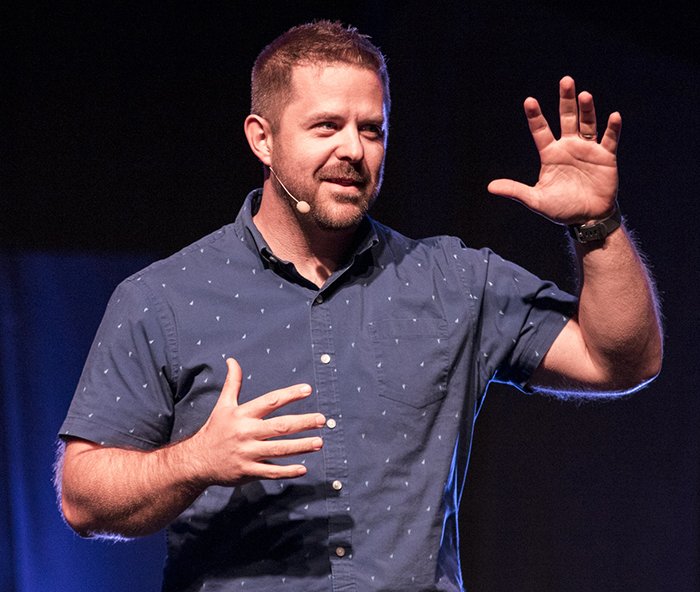
By Rick Vacek
GCU News Bureau
The book of Habakkuk, all three chapters and 1,373 words of it, is positioned near the end of the Old Testament between Nahum and Zephaniah.
“The crispy part,” Luke Simmons of Redemption Church told Chapel on Monday at Grand Canyon University.
But while Habakkuk might not be a particularly well-known prophet, his short-and-to-the-point message forms one of the most interesting passages in the Bible, as Simmons pointed out. “The Scripture is filled with people experiencing their doubts to God,” Simmons said, and Habakkuk certainly is one of them.
Everything in the world is terrible, Habakkuk laments:
How long, Lord, must I call for help,
but You do not listen?
Or cry out to You, “Violence!”
but You do not save?
Why do You make me look at injustice?
Why do You tolerate wrongdoing?
Destruction and violence are before me;
there is strife, and conflict abounds.
Therefore the law is paralyzed,
and justice never prevails.
The wicked hem in the righteous,
so that justice is perverted.
And yet verses 17 and 18 of Chapter 3 conclude with this:
Though the fig tree does not bud
and there are no grapes on the vines,
though the olive crop fails
and the fields produce no food,
though there are no sheep in the pen
and no cattle in the stalls,
yet I will rejoice in the Lord,
I will be joyful in God my Savior.
That, in essence, is what faith is all about, Simmons said. We should ask God the tough questions. We should have doubts about what’s happening in the world. But if we say, “God’s enough for me,” do we really mean it?
Simmons told his large audience at GCU Arena that truly believing means a faith that doesn’t wither in the face of hardship and tragedy.
“If we want to have a faith that’s real, a faith that endures, a faith that’s joyful in the midst of everything else falling apart, we have to be willing to go to God and be honest with Him and then look to Him and His word for answers,” Simmons said.
“Now here’s the thing: We may not particularly like the answer. It may not be the answer our friends would have given us. It may not be the answer we would most liked to have heard. But you won’t have a real faith unless you listen to the real answers in God’s word. Otherwise, you’ll just have this phony, sham faith where you say the things you’re supposed to say, but in your heart, you don’t believe it. And when tragedy strikes and your world is crumbling, that is not a faith that will hold.”
He said the second key thing is to know God as a person, not a concept. Habakkuk wrote in 3:18, “I will rejoice in the Lord.” He called Him by name because it was a personal relationship.
“Notice that John 3:16 does not say, ‘For God so loved the world that He sent a really great idea.’ No, God so loved the world that He sent His Son,” Simmons said.
The key to all human relationships is trust, Simmons noted, and being in relationship with God must be built on trust. It is not a transaction.
“Did you marry God for His money? That’s what we’re saying," he said. "See, some of you have had this experience where things start to go wrong in your life, and instead of saying, ‘You know what? Even if it all falls apart, yet I’ll rejoice in God,’ you say, ‘God, how could You? God, how could You let this happen? Don’t You know all that I did for You?’
“You married God for His money! You’re a good taxpayer. Pay your taxes, you expect the services. That’s not a relationship; that’s a transaction.”
Jesus knew our pain, Simmons said. Everything fell down around Him, his friends betrayed Him, even His Father turned away from Him, and yet He endured it all for us.
Our answer to that, in Simmons’ estimation, should be to become “even if” people:
“Imagine if the people of God were not the people who were always worried about ‘What if?’ What if this bad thing happens? What if that bad thing happens? What if I don’t get this future? What if I don’t have that opportunity? What if? What if? What if? Just living by fear – don’t you feel like the church of Jesus Christ, of all people, should not be the people who live by fear? Can you imagine if we moved from being ‘what if, what if, what if’ people to ‘even if’ people? …
“Even if it only gets worse from here, yet I will rejoice in the Lord, because He’s what I really need.”
● Chapel replay.
● Next week’s Chapel speaker: Rose Mapendo, Congolese civil rights activist
Contact Rick Vacek at (602) 639-8203 or [email protected].



































































